| Srl | Item |
| 1 |
ID:
139804
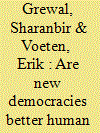

|
|
|
|
|
| Summary/Abstract |
Recent scholarship finds that new democracies are more likely than established democracies to make binding commitments to international human rights institutions. Are new democracies also better at following through on these commitments? Stated differently, does their greater willingness to join international institutions reflect a genuine commitment to human rights reform or is it just “cheap talk?” We analyze this question using a new data set of more than 1,000 leading European Court of Human Rights (ECtHR) cases. Since new democracies face judgments that are more difficult to implement than established democracies, we employ a genetic matching algorithm to balance the data set. After controlling for bureaucratic and judicial capacity, we find that new democracies do implement similar ECtHR judgments initially more quickly than established democracies, but this effect reverses the longer a judgment remains pending. Although new democracies have incentives to implement judgments quickly, they sometimes lack checks and balances that help ensure implementation should an executive resist.
|
|
|
|
|
|
|
|
|
|
|
|
|
|
|
|
| 2 |
ID:
180730
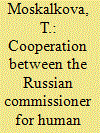

|
|
|
|
|
| Summary/Abstract |
TODAY, we can hardly overestimate the role of integration communities in strengthening the safeguards of human rights and freedoms that are constantly being tested, challenged and threatened in our turbulent world. The Council of Europe, established on May 5, 1949, in response to the disastrous shocks of World War Two caused primarily by massive and cynical violations and even destruction of human rights, plays the leading role on the European continent. It remains the most respected international entity for setting standards for the rule of law, human rights, democratic development and cultural interaction.
|
|
|
|
|
|
|
|
|
|
|
|
|
|
|
|
| 3 |
ID:
126074
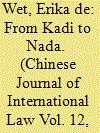

|
|
|
|
|
| Publication |
2013.
|
| Summary/Abstract |
This contribution analyses the implications of the Kadi decision of the European Court of Justice of July 2013 and the Nada decision of the European Court of Human Rights of September 2013. Both decisions have given preference to human rights standards over United Nations Security Council (UNSC) sanctions stemming from the Resolution 1267 (1999) sanctions regime. However, they used very different techniques in coming to similar results, with implications for the effective enforcement of UNSC binding decisions and the unity of international law.
|
|
|
|
|
|
|
|
|
|
|
|
|
|
|
|
| 4 |
ID:
184168
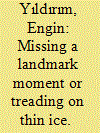

|
|
|
|
|
| Summary/Abstract |
The paper seeks to analyze how the Turkish Constitutional Court has resolved sexual orientation and gender identity cases and constructed the LGBT+ subject in constitutional terms in its initial forays into this controversy-laden issue. It suggests that, although the Court missed a landmark moment for the protection of sexual minorities, the recognition of sexual orientation as a ground of discrimination in the case law of the Court represents an important step as it appears to have opted for proceeding in a piecemeal fashion in recognizing LGBT+ rights.
|
|
|
|
|
|
|
|
|
|
|
|
|
|
|
|
| 5 |
ID:
140581
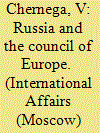

|
|
|
|
|
| Summary/Abstract |
Russian media have paid quite a lot of attention to the April 2014 resolution of the Parliamentary Assembly of the Council of Europe (PACE) that deprived the Russian delegation of its right to vote, a move that, in effect, was upheld by PACE in January 2015.
|
|
|
|
|
|
|
|
|
|
|
|
|
|
|
|
| 6 |
ID:
138272
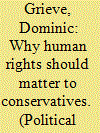

|
|
|
|
|
| Summary/Abstract |
In a speech given to the University of London's Constitution Unit and Judicial Institute on 3 December 2014, the Rt Hon Dominic Grieve QC MP challenged Conservatives to think carefully about the party's proposal to break the link between British courts and the European Court of Human Rights in Strasbourg. Grieve recalled why the United Kingdom signed the Convention in the first place and, although recognising that the Court's approach has been on occasion properly criticised and may present difficulties, argued that the reforms embodied in the Brighton Declaration 2012 are bearing fruit. He provided a critical exposition of the Conservative paper ‘Protecting Human Rights in the UK: the Conservatives’ Proposals for changing Britain's Human Rights Laws’ (October 2014) and concluded that Conservatives should want to remain within the jurisdiction of the ECHR to maintain and ensure the Court's effectiveness and continued viability.
|
|
|
|
|
|
|
|
|
|
|
|
|
|
|
|